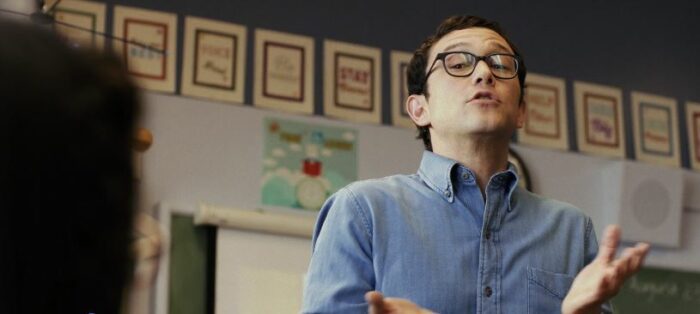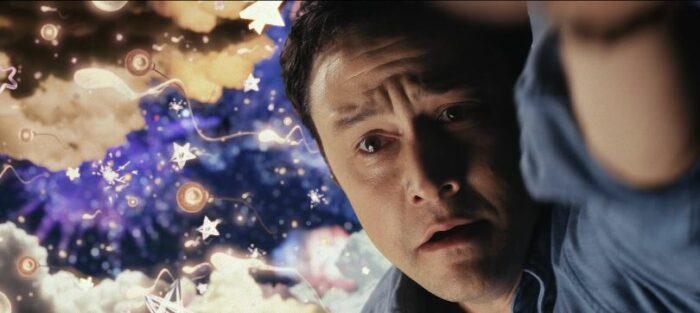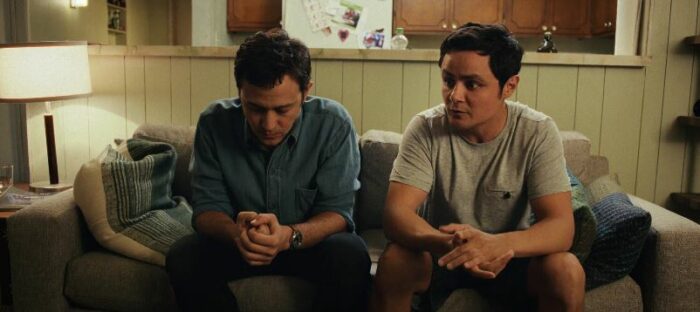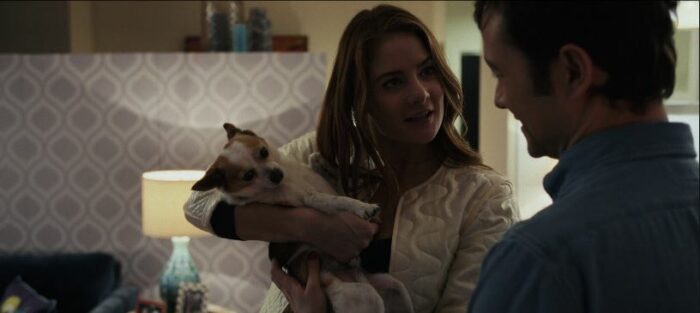The following contains spoilers for Mr. Corman S1E1, “Good Luck”
There is a particular kind of millennial anxiety that pervades Mr. Corman that I can’t help but relate to. It’s as though we were told to be ourselves and reach for the stars but then feel almost guilt at failing to reach them. The postmodern superego urges us to enjoy and yet we slip into ennui.
Enjoy your work! But perhaps I don’t and I feel bad about that.
We should do something tonight! It’s Friday. What can we do that would be fun? Why does this question feel like it’s harder to answer than it should be?
Josh Corman (Joseph Gordon-Levitt) wanted to be a musician. Or is he a musician? He doesn’t even play for himself anymore. And though that changes at the end of Mr. Corman S1E1, there’s nothing to indicate that this will be some kind of breakthrough that will lead Josh to future happiness. On the contrary, he dithers and hesitates. There is a moment of satisfying harmony as he strikes a chord and the credits hit, but then he fidgets and fumbles some more, heard but unseen, as they roll.

Mr. Corman is a teacher, and he respects his fifth-grade students. He worries about whether Mandy (Aracely Padilla) was right to question him for calling Sacagawea a “female guide”—he even mentions it to his mother Ruth (Debra Winger) later, when he gives her a ride home because she’s drunk.
Oh darling, don’t do that to yourself.
Mr. Corman questions authority because we’ve been questioning authority since we were young in the ‘90s, but it’s not really fun anymore when you’re middle-aged and the authority you’re questioning includes your own.
Josh lives in a state of uncertainty about who he is and where he is going in life. But moreover, he lives in a state of uncertainty as to who he should be and where he should be going in life. He’s insulted by his mother’s suggestion that “family is all that matters”—does this imply that nothing else he does matters? What if he doesn’t start a family? Maybe he won’t. He’s single.
Surely he also has a point. What matters in life can’t just be having children. What makes their lives matter? Their children? Is it some kind of infinite regress (or progress) of meaning without end or closure? Doesn’t there have to be something that ties it all together or that transcends such myopic concerns? Aren’t our concerns supposed to be global?

“Shouldn’t all that matters be this moment that we’re living in right now?” Josh asks. His mother’s reply is a curt, “no.”
And this is the humor in Mr. Corman, which we also see when Mandy calls Josh out in class about using the word “female” and again when Victor (Arturo Castro) questions his sudden desire to go out and do something on a Friday night. Maybe it’s not weird, but it’s weird for him.
The humor stems from a kind of generalized anxiety. Does success depend on luck? Who in class agrees with that? Mr. Corman asks because he doesn’t know the answer. He doesn’t even know whether he thinks of himself as a lucky person; he just thinks he should think of himself as such, while his fifth-graders are somehow just more secure in how they respond. Most all of them do not feel lucky, and they have no shame in this. Imagine that.
Not everyone can be special—it’s a matter of definition. Yet somehow those of us born in the early 1980s were all made to feel that we should be. Boomers will declaim about participation trophies without thinking about who gave us those trophies. We certainly weren’t giving them to ourselves. But the more pernicious thing is that everyone has always known that they suck and are meaningless, merely feeding in an indirect way into this sense that one ought to be more and that praise isn’t to be trusted. Even if we lose the imperative remains: Enjoy!

Josh wants to go to the bar to meet girls women but also doesn’t want to go because he’s sure they won’t have anything interesting to say—not because they’re girls women, but because most people don’t have anything interesting to say. He’ll pretend to be interested in what they’re saying, though, because he wants sex, but then he’ll feel like a phony.
I can relate.
And this is basically what happens when he meets Lindsey (Emily Tremaine) at the bar. She’s absolutely right in how she reads him. He doesn’t want to hang out if they’re not having sex. And they’re not having sex due to his impotency in the moment. So he’s caught in a little cycle of shame, and it’s multi-faceted. He can’t truly be honest insofar as that would entail admitting that he doesn’t find her interesting as a person.
Maybe she’s right that he likes being a loser. Josh doesn’t know. She’s certainly right that he aspired to be something other than a teacher.
There is a realism to the scene that occurs at Lindsey’s apartment that gets frankly a bit uncomfortable. The preamble to sex that fails to result in sex is clumsy and awkward. But this is often how these things go. Maybe you’re drunk and don’t think about it too much, but it’s striking to me how effectively Mr. Corman paints a picture of this kind of rendevous with a person you hardly know or have just met. And now you’re back at her apartment with her yapping little dog, and you don’t know how to do things or how to move in this space…
And then their fight as well, if we can call it that, bursting through this moment of intimacy between virtual strangers. You’re in a space now where you have to admit that you don’t really know each other—where the illusion of the hookup has broken and along with it that tentative trust you’d decided to have in this other person. Suddenly you don’t know what you were thinking. And we see this cutting in both directions.
This realism is broken thoroughly, however, as Josh flies out the window and begins soaring among the stars. Did Lindsey really punch him? For that matter, did he really say that line asking her if she always knew she was going to die alone?
I don’t think Mr. Corman is going to be playing with a supernatural element, but it does touch up against magical realism here. Whatever happened at a factual level, what we see is the truth—the shattering of that tenuous bond that Josh and Lindsey had begun to form. I’m sure he will indeed fantasize about it later.

Good Luck
In its penultimate scene, Mr. Corman S1E1 circles back to the façade of the everyday as Josh returns to school on Monday. It’s not that it’s fake. The surface that he projects as a teacher is also him. But it covers over that anxiety that has no place here.
I have it really good […] it just…it doesn’t always feel that way, I guess.
Well, I mean…whose fault is that?
Thanks, mom.

I’m excited to see where Mr. Corman is going. All I can say for sure is that it’s not going to end up with Josh always feeling that he has it really good. It’s clear that Joseph Gordon-Levitt (who is also credited with writing and directing the show) is presenting us with something more nuanced than that. This is a portrait of the human condition, and perhaps in particular the millennial condition, as we’ve settled into a sort of mature listlessness.
We could blame our parents or society, and to some extent we certainly blame ourselves, but that’s not what matters. Is what matters this moment that we’re living in right now?

